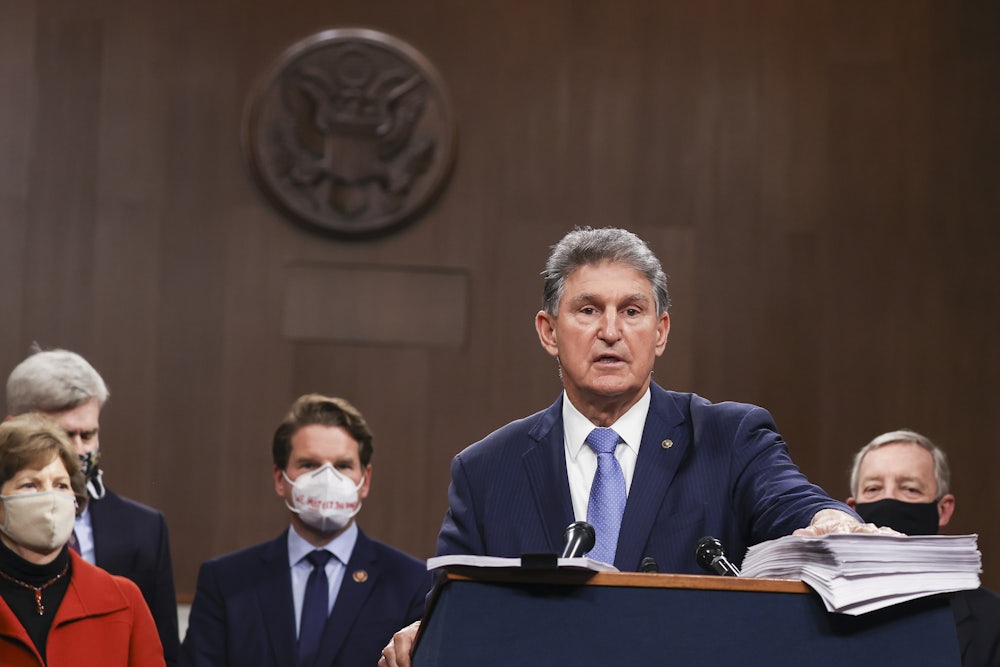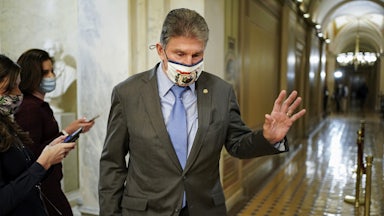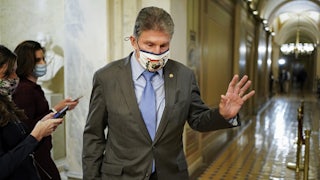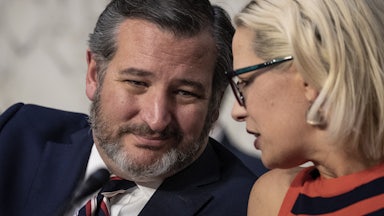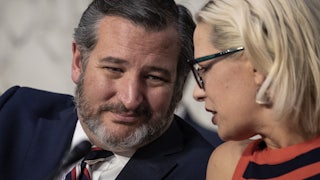In a series of interviews that aired this past weekend, West Virginia Senator Joe Manchin offered progressives a glimmer of hope about the future of the Democratic legislative agenda. “There should be pain to a filibuster,” he told Axios’s Mike Allen. “They talked before—some of the rules could be changed a little bit, but not to the point where just a simple majority rules.” Manchin said the same to NBC’s Chuck Todd and Fox News’s Chris Wallace.
Of course, the notion that a simple majority in the Senate shouldn’t rule remains an extraordinarily silly and anti-democratic idea—one, for those who care about such things, that happens to be out of step with the Framers’ original design for the chamber. Manchin’s press tour nevertheless cracked open the door to the wide and wonky world of filibuster reforms; it’s now up to the Democratic majority to choose how they might pursue the effort. Biden’s entire agenda may depend on what they decide.
The number of options they have available to them reflects the fact that what we call the “the filibuster” is really an amalgam of procedures that have fused over time to create the hurdle Democrats now face: In order to invoke cloture to close debate and pass ordinary legislation, a bill’s supporters have to gather a 60-vote supermajority. As Manchin says, senators used to extend debate and obstruct legislation by talking continuously on the floor. Performatively lengthy speeches on legislation survive as political theater and are often referred to as “filibusters” by senators and the press, but no one actually needs to extend debate in order to block bills in the chamber today. All a senator has to do is levy an objection, which functionally raises the threshold for advancing a bill to the 60-vote supermajority threshold.
“There’s sort of two parts to the filibuster,” Adam Jentleson, author of Kill Switch: The Rise of the Modern Senate and the Crippling of American Democracy, tells The New Republic. “There’s the talking part in the Jimmy Stewart style, and then there’s the supermajority threshold. And they used to be separate. For most of the Senate’s existence, there was no supermajority threshold and to filibuster, you actually had to talk in the way that most people think of when they think of the filibuster. The supermajority threshold kind of got grafted onto it in the Jim Crow era, specifically and exclusively to block civil rights bills. It started to become a more common practice toward the end of the twentieth century and then exploded under [Mitch] McConnell.”
Potential reforms to the supermajority requirement include exempting certain kinds of bills from the filibuster, making it possible to break the filibuster with fewer votes, and placing the burden on Senate minorities to sustain filibusters with a certain number of voters present rather than demanding that the majority reach a supermajority to break them.
But Manchin seems primarily interested in restoring the filibuster of popular imagination—requiring the filibustering minority to hold the floor continuously with long speeches. In 2012, Oregon Senator Jeff Merkley drafted a proposal that would do just this—to sustain a filibuster, a minority would have to keep at least one member speaking to keep “extended debate” on a bill open. “If, at any time during the period of extended debate, no senator were present to speak to the bill, then the presiding officer of the Senate would rule that the period of extended debate is over,” he explained in a memo to colleagues. “The Majority Leader would then schedule a simple majority cloture vote on the bill.”
Nevertheless, it’s very easy to imagine Republicans holding firm and collaborating to sustain indefinitely long filibusters against most of the significant and ambitious legislation progressives hope to see passed. They could also try to blockade legislation by means outside the conventional filibuster, as Dylan Matthews, then of The Washington Post, wrote after the release of Merkley’s proposal. “The Merkley proposal does nothing to block ‘holds’ by individual senators,” he pointed out. “Those individuals could still, by denying unanimous consent to close debate before a cloture vote is even called, hold up bills and nominations singlehandedly.”
“More troublingly,” Matthews notes, “Merkley’s proposal would allow consideration of amendments during the talking filibuster, which raises the prospect of ‘filibuster by amendment,” wherein the minority files a huge number of amendments so that the sheer number of votes bogs down the process.”
While there’s obviously reason for progressives to hail Manchin’s comments as a meaningful step forward, the number of possible directions any compromises, and the Republican responses to them, might take are reasons for wariness. And Fix Our Senate, a large coalition of progressive groups with stakes in legislation that the filibuster will certainly doom, is still pushing for its full elimination. “Is there a moment when McConnell can no longer stop a bill from coming to an up-or-down vote?” the group’s spokesperson, Eli Zupnick, asks. “As we look at these potential compromises or potential landing spots, to us, and to many others, that’s the most important part. There’s absolutely nothing wrong with debate. Of course the minority should have input. But at the end of the day, the minority should not be allowed to obstruct the bill from coming to an up-or-down vote and moving if there’s a majority of support.”
Both Jentleson and Zupnick believe Democrats will have to give some definition to Manchin’s musings and come to a decision on the filibuster soon. With immigration reform, gun background checks, the Protecting the Right to Organize Act, a pair of voting rights measures including H.R. 1, and a potential infrastructure package waiting in the wings, the post-Covid legislative calendar is already quite crowded. And all of those bills, with the potential exception of infrastructure, would have to be passed as ordinary legislation outside of budget reconciliation. The urgency of the filibuster question still hasn’t motivated a shift in the White House’s position or messaging. “The president’s preference is not to get rid of the filibuster,” White House press secretary Jen Psaki reiterated on Monday. But the decisions on whether it goes and what new form it might take if it stays will ultimately by made by Manchin and the chamber’s pivotal Democrats. For the first time, Manchin seems to be acknowledging, at the very least, that decisions must be made. It’s a start.
